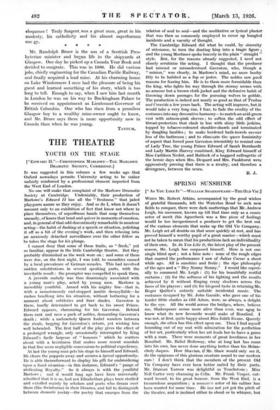THE THEATRE
YOUTH ON THE STAGE "EDWARD IL"—CHRISTOPHER MARLOWE—THE MARLOWE DRAMATIC SOCIETY, CAMBRIDGE.] IT was suggested in this column a few weeks ago that Oxford nowadays permits University acting to be rather unfairly reinforced by a professional element imported from the West End of London.
No one will make that complaint of the Marlowe Dramatic Society at Cambridge. Undeniably, their production of Marlowe's Edward II has all the " freshness " that jaded playgoers assure us they enjoy. And so do I, when it doesn't amount only to an exhibition of feet that know not where to place themselves, of superfluous hands that soap themselves uneasily, of knees that bend and quiver in moments of emotion, and, in general of that odd discontinuity remarkable in amateur acting—the habit of dashing at a speech or situation, polishing it off as a bit of the evening's work, and then relaxing into an anxiously detached surveillance over the other fellow as he takes the stage for his plunge.
I cannot deny that some of these traits, so " fresh," yet so familiar, appear in the little Cambridge theatre. But they probably diminished as the week wore on ; and some of them were due, on the first night, I was told, to casualties caused by a local prevalence of German measles. This had involved sudden substitutions in several speaking parts, with the inevitable result : the prompter was compelled to speak them.
A juvenile malady was thus disarmingly associated with a young man's play, acted by young men. Marlowe is incredibly youthful. Armed with his mighty line—that is, with a monotonously end-stopped iambic decasyllable—he rushes headlong into his situation, without bothering for a moment about subtleties and finer shades. Gaveston is there, loudly determined to get back to his sweet Prince. Edward appears, clamouring for his Gaveston. Behind them rant and rave a pack of nobles, demanding Gaveston's death ; while a melancholy Queen Isabel wanders between the rivals, begging for Gaveston's return, yet wishing him well beheaded. The first half of the play gives the effect of a prolonged wrangle, only occasionally interrupted by King Edward's facile largesse of " honours " which he scatters about with a lavishness that makes more recent scandals in that line seem negligible concessions to political expediency.
At last the young man gets his stage to himself and Edward. He clears the puppets away and secures a lyrical opportunity.
He is able thenceforward to display his gift for embroidering upon a fixed situation—in this instance, Edward's " pangs of abdicating Royalty." So it always is with the youthful Marlowe ; and it would long ago have been universally admitted that it is so, had not Elizabethan plays been studied and extolled mainly by scholars and poets who dream over them (like Swinburne) in their libraries, and fail to distinguish between dramatic poetry—the poetry that emerges from the relation of soul to soul—and the meditative or lyrical plaster- that was then so commonly employed to cover up bungled incidents and a vacuity of thought.
The Cambridge Edward did what he could, by sincerity of utterance, to turn the coating king into a tragic figure ; and the young Mortimer spoke bravely in the plain " straight " style. But, for the reasons already suggested, I need not closely scrutinize the acting. I thought that the producer had miscast or misunderstood Gaveston, who, though a " minion," was clearly, in Marlowe's mind, no mere booby fitly to be habited as a fop or jester. The nobles saw good reasons for fearing him. He is to them more formidable than the king, who fights his way through the stormy scenes with no armour but a brown cloth jacket and the defensive habit of throwing down peerages for the pursuing wolves to gobble. The production is indeed not nearly so good as that of Troilus and Cressida a few years back. The acting will improve, but it would take a very long run, I fear, to fade the crudity of the costumes into any decorative harmony—to match an acid-green vest with salmon-pink sleeves ; to soften the odd effect of throat-protectors that clash in hue with shiny little jerkins, topped by tobacco-coloured shoulder-shawls and terminated by dangling baubles ; to make bordered bath-towels savour less of the bathroom ; and to eliminate the queer femininity of aspect that forced poor Gaveston irresistibly to remind one of Lady Tree, the young Prince Edward of Sarah Bernhardt and Lady Martin Harvey combined, King Edward himself of Miss Cathleen Nesbit, and Baldock of a haggard suffragette of the heroic days when Mrs. Despard and Mrs. Pankhurst were aggressively proving that there is a rivalry, and therefore a






























































 Previous page
Previous page